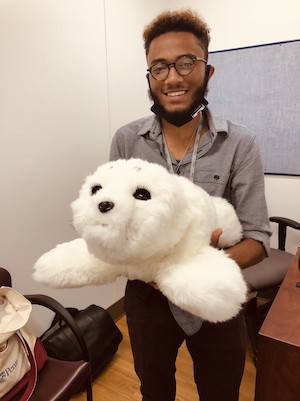Undergrads Spend Summer Studying Alzheimer’s Disease

Editor's note: This article was written prior to University of the Sciences' merger with and into Saint Joseph's University and does not reflect the current, combined institution. References to programs, offices, colleges, employees, etc., may be historical information.
 Carrying a plush seal PARO robot in a pet carrier, Joseph Dupree '24 (Neuro) visits the Acute Care for Elders Unit at Penn Presbyterian Medical Center in West Philadelphia three days a week. Dupree’s seal is a prop in a research study which he is helping to run over this summer, which examines the responses of individuals with dementia and/or delirium.
Carrying a plush seal PARO robot in a pet carrier, Joseph Dupree '24 (Neuro) visits the Acute Care for Elders Unit at Penn Presbyterian Medical Center in West Philadelphia three days a week. Dupree’s seal is a prop in a research study which he is helping to run over this summer, which examines the responses of individuals with dementia and/or delirium.
“We see how they interact with the seal and see if they become less restless or agitated,” said Dupree. “The first time I went into the hospital I saw the patients change. Actually seeing the research in person, seeing the reaction and impact on the patient was incredible.”
Dupree is one of two USciences students who participated in the Alzheimer’s Summer Internship program at the University of Pennsylvania’s Penn Memory Center for black or African American students. The study, called The Aging Brain Cohort Dedicated to Diversity (ABCD2) Study, is seeking a comprehensive set of biological and cognitive markers of Alzheimer’s disease in black/African American residents of Pennsylvania and is funded by the Pennsylvania Department of Health.
In addition to these patient interactions with Lucy and Ricky, the robots, Dupree is participating in computational research, trying to find risk genes for Alzheimer's and related links, or conducting literature reviews.
“Dementia is one of the areas of research I am very interested in,” he said. “My mom’s mom had Alzheimer's and so that is what intrigued me about this opportunity. For persons of color, dementia and Alzhiemer’s are not spoken about in the community, so helping to break this stigma is important.”
Stephen Moelter, PhD, co-director of the neuroscience program and associate professor of psychology and neuroscience at USciences, said this experience provides a great opportunity for USciences students to experience research in a new way. Moelter is a co-investigator on the grant where he assists in the development of the summer internship and the investigation of cognitive markers of Alzheimer's.
“The project’s joint goals of addressing the relative absence of high-quality Alzheimer’s biomarker data in African-Americans and delivering a high-quality summer internship experience to African-American undergraduate and graduate students are – in my mind – essential,” said Dr. Moelter. “These objectives will improve diagnosis and treatment of AD and take a small step toward closing the systemic gaps that create barriers for students from under-represented groups getting started in biomedical research.”
Each student in the program has at least one mentor working with them on a different type of research into this topic. All of the students share in mentorship sessions and lectures to share their experience and network with one another.
Alexis Visco '23 (BMS) worked on a project focused on social and structural determinants of health in relation to Alzheimer's disease. These are the factors in someone's life that can disproportionately affect them -- such as socio-economic status, quality of education, access to healthcare, etc. This summer Visco collected survey data to make visualizations to be used in poster presentations and a publication about the impact of these factors on Alzheimer's disease.
"It made me think a lot more about the social and structural determinants of health and how it can affect people," she said. "Public health is definitely a new found interest of mine as SSDOH (social and structural determinants of health) is a big topic in public health. I am considering getting a degree in public health now because of this project as it is really interesting and applies in other topics as well and not just Alzheimer’s disease."
